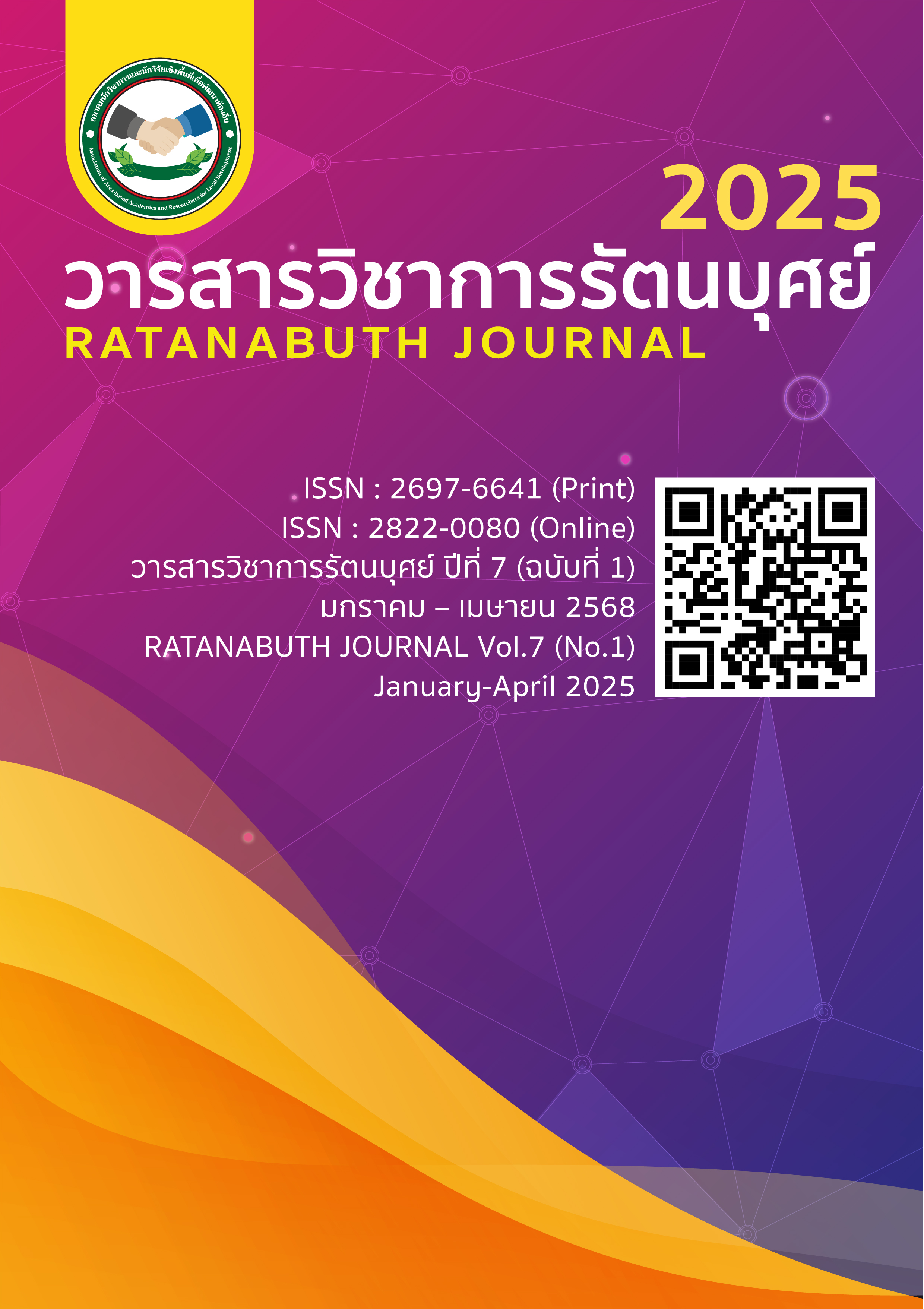Strategies to Develop and Promote Sustainable Community-based Heritage Tourism: A Case Study of Ponepisai District, Nongkhai Province Strategies to Develop and Promote Sustainable Community-based Heritage Tourism: A Case Study of Ponepisai District, Nongkhai Province
Main Article Content
Abstract
This research aimed to 1) study the historical capital and tourism resources for continuity-based tourism, 2) study the strategies for developing continuity-based tourism based on the community, 3) study marketing strategies to promote continuity-based tourism based on the community, and 4) study awareness-raising and participation in the development and promotion of continuity-based tourism based on the community in Phon Phisai District, Nong Khai Province. This qualitative research was conducted through in-depth interviews with 15 key informants from the government, private sector, community, and academia, and data synthesis was done using SWOT Analysis and TOWS Matrix.
The research findings revealed that 1) Phon Phisai District, Nong Khai Province, had remarkable potential as a target city for continuity-based tourism due to its beautiful natural resources and the globally renowned Naga Fireball phenomenon. It also had a variety of cultural and traditional tourist attractions and activities that reflected the local identity. 2) The development of tourism in Phon Phisai employed the "UNITETOUR" paradigm, consisting of Unity, Network, Integration, Technology, Education, Teamwork, and Understanding, to coordinate and create tourism experiences through the use of Naga Fireballs and the preservation of traditional customs, along with the development of infrastructure and digital publicity. 3) The SO strategies included developing cultural festivals, using digital publicity, and attracting niche tourists. The ST strategies focused on raising community awareness, using technology to solve problems, and planning for sustainable development. The WO strategies emphasized brand building, promoting at national and international levels, and using technology to design marketing programs. The WT strategies involved brand development, promoting and expanding activities, creating marketing networks, and preventing environmental impacts. 4) Promoting natural resource conservation, enhancing local identity, increasing income, and reducing tourism impacts through conservation-based activities and cultural promotion, such as Mister Tourism Intercontinental contests, speech competitions, and filming of Yaoi series.
Article Details

This work is licensed under a Creative Commons Attribution-NonCommercial-NoDerivatives 4.0 International License.
References
กฤษณะ เนียมหอม, และ กัมปนาท วงษ์วัฒนพงษ์. (2564). การจัดการท่องเที่ยวเชิงวัฒนธรรมโดยชุมชน. Journal of Roi Kaensarn Academi, 6(11), 350–363.
เกตวดี หมัดเด็น, และ ปนัดดา ศิริพานิช. (2565). พัฒนาการการท่องเที่ยวเชิงวัฒนธรรมชุมชน ท่าหิน อำเภอสทิงพระ จังหวัดสงขลา. วารสารอินทนิลทักษิณสาร มหาวิทยาลัยทักษิณ, 17(1), 9–36.
ชุติพงศ์ คงสันเทียะ, ศรัณย์ เจริญศิริ, สรัญญา จุฑานิล, และ ธีรพล วีระศิริ. (2563). ศักยภาพปัญหาและความต้องการของประชาชน: กรณีศึกษาบ้านเชียงอาดเหนือ หมู่ที่ 13 ตำบลเหล่าต่างคำ อำเภอโพนพิสัย จังหวัดหนองคาย. วารสารวิจัยและนวัตกรรมท้องถิ่น, 15(2), 25–39.
ชุลีวรรณ ปราณีธรรม. (2564). ความตระหนักและการมีส่วนร่วมของนักท่องเที่ยวชาวไทยในการอนุรักษ์ทรัพยากรการท่องเที่ยวทางธรรมชาติในเกาะสมุยจังหวัดสุราษฎร์ธาน. วิทยาลัยนานาชาติการท่องเที่ยว, มหาวิทยาลัยราชภัฏสุราษฎร์ธานี.
ประพจน์ ณ บางช้าง. (2564). การพัฒนานวัตกรรมการสื่อสารแบบมีส่วนร่วมของชุมชนเพื่อส่งเสริมการท่องเที่ยวเชิงสร้างสรรค์อย่างยั่งยืนของจังหวัดระนอง. วารสารนิเทศศาสตรปริทัศน์, 25(3), 156–167.
ปรีชา วรารัตน์ไชย. (2562). แนวทางพัฒนาทางการตลาดธุรกิจน้ำดื่มบรรจุขวดของผู้ประกอบการขนาดย่อมในระดับท้องถิ่น (รายงานวิจัย). วิทยาลัยโลจิสติกส์และซัพพลายเชน, มหาวิทยาลัยราชภัฏสวนสุนันทา.
รณรงค์ เคนรักษา, และ ปรีชา วรารัตน์ไชย. (2562). ระบบการจัดการโลจิสติกส์ในการท่องเที่ยวของปรากฏการณ์บั้งไฟพญานาค อำเภอโพนพิสัย จังหวัดหนองคาย. วารสารวิชาการสังคมศาสตร์เครือข่ายวิจัยประชาชื่น, 1(2), 38–51.
วนิดา อ่อนละมัย. (2565). แนวทางการพัฒนารูปแบบกิจกรรมการท่องเที่ยวอย่างมีความรับผิดชอบเพื่อการท่องเที่ยวอย่างยั่งยืน ชุมชนบ้านศรีฐาน จังหวัดขอนแก่น. วารสารบริหารธุรกิจและสังคมศาสตร์ มหาวิทยาลัยรามคําแหง, 5(2), 42–56.
วรพล เกิดแก้ว. (2565). การศึกษาการนำนโยบายส่งเสริมการท่องเที่ยวเมืองรองไปปฏิบัติในจังหวัดราชบุรี. วิทยานิพนธ์รัฐประศาสนศาสตรมหาบัณฑิต, จุฬาลงกรณ์มหาวิทยาลัย.
สำนักสภาพัฒนาการเศรษฐกิจและสังคมแห่งชาติ. (2565). รายงานฉบับสมบูรณ์ (Final Report) โครงการการพัฒนาระบบสถิติข้อมูลและตัวชี้วัดเพื่อใช้ในการบริหารราชการแผ่นดินตามยุทธศาสตร์ชาติ ประเด็นที่ 5 การท่องเที่ยว. ศูนย์บริการวิชาการแห่งจุฬาลงกรณ์มหาวิทยาลัย.
สิทธิพรร์ สุนทร สถิตคุณ บุญเรือน, สกนธ์ ดำสาคร, ภัณฑิลา น้อยเจริญ, และ รัตนาภรณ์ ธรรมโกศล. (2564). ความพึงพอใจของประชาชนต่อการให้บริการสาธารณะขององค์การบริหารส่วนตำบลนาหนัง อำเภอโพนพิสัย จังหวัดหนองคาย ประจำปีงบประมาณ พ.ศ. 2564. วารสารมหาจุฬานาครทรรศน์, 9(11), 245–255.
สุธิดารัตน์ มัทธวรัตน์, และ ชยาภรณ์ ศฤงคารทวีกุล. (2564). การบริหารจัดการเพื่อความยั่งยืนของการท่องเที่ยวเชิงวัฒนธรรมโดยวิถีชุมชน: กรณีศึกษา ชุมชนกำแพงทองพัฒนา เขตภาษีเจริญ กรุงเทพมหานคร. วารสารสถาบันวิจัยญาณสังวร, 12(2), 106–116.
เอกภพ ช่างแก้ว, วารัชต์ มัธยมบุรุษ, ประกอบศิริ ภักดีพินิจ, และ พัจน์พิตตา ศรีสมพงษ์. (2567). บทเรียนจากเมืองกุมมะ ประเทศญี่ปุ่น: การสร้างแบรนด์ท่องเที่ยวที่ยั่งยืนในจังหวัดเชียงราย. วารสารวิชาการมนุษยศาสตร์และสังคมศาสตร์มหาวิทยาลัยราชภัฏอุตรดิตถ์, 11(1), 1–13.
TAT Review. (2022). สถานการณ์การท่องเที่ยวตลาดในประเทศปี 2565. สืบค้นเมื่อ 5 มกราคม 2568, จาก https://tatreviewmagazine.com/article/situation2022-domestic/.
UNWTO. (2020). Tourism and sustainability: Strategies for the Mekong Region. UNWTO Reports Series.


